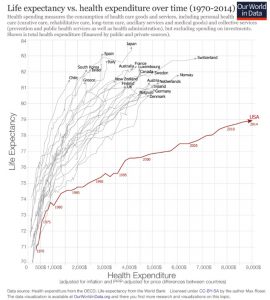The Health Care Blog posted the following “Population Health Isn’t Working Out Quite the Way They Said It Would. What’s Going On?” Authored by Hilary R. Hatch, Ph.D. from Vital Score, Inc.
I agree with all that Hatch presented especially the headline quote. It is all about collaboration. Her primary premiss is that we are putting patients into categories by conditions (i.e. diabetes, heart disease, etc.) when patients with the same conditions are different. She gives the example of depression and notes that for her depression is a billing condition and not relevant to treatment planning for a vast array of patients, those in mourning, postpartum moms, isolated geriatric patient, etc. Hatch further addressed how population health is failing in the physicians office.
“When the population health need gets attention, is it at the expense of the individual’s need? Care plans driven by population health diagnostic categories are more formulaic, symptom-focused and may ignore root causes. As such, they are less likely to be successful. Then, when patients fail in flawed care plans, we indulge in blaming and name-calling: “non-compliant” or “non-adherent.”
Hatch continues her logic with the thought that non-adherence is resistance by the patient to different forces such as cost, the patient sense the drug or therapy is not working, and other factors. Her solution and rightly so is to help patients ‘choose their own adventure’ to identify their pathways to health and success.
“…when people self-identify needs and self-refer to services, their participation rate increases up to 20x. People own their choices because their choices are personally driven for their own benefit. It’s not only better for workflow, it’s better for outcomes.”
In my opinion Hatch argues clearly and is spot on when it comes to motivating patients. It is all about self-identified goals and management from the bottom up (patient) not the top down (HCP). But I would add to this the work of Malcolm Knowles who studied how adults learn. If we understand and use adult learning we can improve patient motivation.
- Self-concept: As a person matures his self concept moves from one of being a dependent personality toward one of being a self-directed human being
- Experience: As a person matures he accumulates a growing reservoir of experience that becomes an increasing resource for learning.
- Readiness to learn. As a person matures his readiness to learn becomes oriented increasingly to the developmental tasks of his social roles.
- Orientation to learning. As a person matures his time perspective changes from one of postponed application of knowledge to immediacy of application, and accordingly his orientation toward learning shifts from one of subject-centeredness to one of problem centredness.
- Motivation to learn: As a person matures the motivation to learn is internal
This can be summed up in the simple idea, adults will only learn when they are seeking solutions to problems they have. I posted this a couple of years ago on Knowles.







 artesian aquifer. It flows from within, bored out of the loss of a loved one.It is part love and light. It holds promise to satisfyingly quench our loss. To sustain us.
artesian aquifer. It flows from within, bored out of the loss of a loved one.It is part love and light. It holds promise to satisfyingly quench our loss. To sustain us.
 we stop to explore. Or being carried downstream passing the point where familiar become unfamiliar. That is the polynomial equation of life: time, age, and reflection.
we stop to explore. Or being carried downstream passing the point where familiar become unfamiliar. That is the polynomial equation of life: time, age, and reflection.